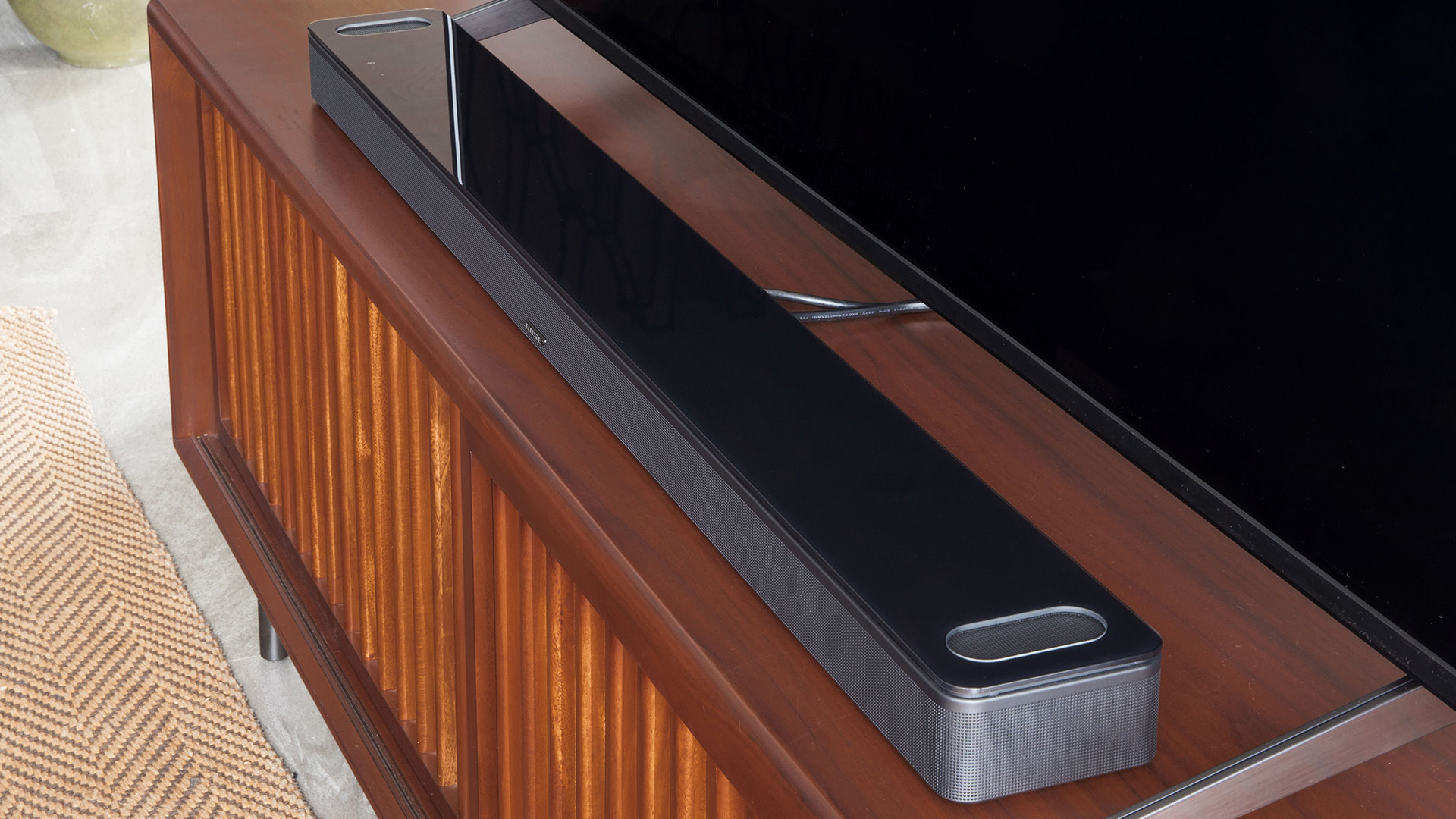
Bose Smart Ultra Soundbar review: two-minute review
The Bose Smart Ultra Soundbar arrives as the most upmarket, most expensive member of the Bose family of soundbars – and it’s been given the far-from-enviable task of taking the Sonos Arc down a peg or two as the most popular all-in-one big soundbar. Which means it has its work cut out.
First impressions – and second impressions too, for that matter – are very good, though. The Smart Ultra is properly built and finished from tactile, high-quality materials, and by the standards of the best soundbars, it’s of very discreet proportions. It’s well specified, including dedicated upward-facing speaker drivers – you’ve always a better chance of generating a convincing impression of spatial audio if you’ve got the physical equipment (rather than just some clever sound processing) to help you. And between a remote control handset, a couple of physical on-bar controls, voice-assistant compatibility, and one of the better control apps out there, getting what you want from the Bose couldn’t be any simpler.
In performance terms, it generally makes a good impression too. Certainly no one’s going to be disappointed by the width and coherence of its soundstage, nor by the impressive amount of detail it retains and delivers from a soundtrack. Dialogue, in particular, enjoys proper expression – and, as we know, that’s always the most important part of any movie soundtrack. There’s a slight shortage of low-end ‘punch’ and substance to the sound, though, and only a very modest sensation of the audio ‘height’ that is basically the whole point of getting one of the best Dolby Atmos soundbars.
And when you remember that ‘punch’ and ‘height’ are among the two real strengths of the usually cheaper Sonos Arc or the more expensive but exquisite Sennheiser Ambeo Plus, it becomes apparent that the Bose Smart Ultra Soundbar is sitting in a slightly awkward spot – however, it's notably more compact than the Sonos Arc, which may make it a winner for some people.
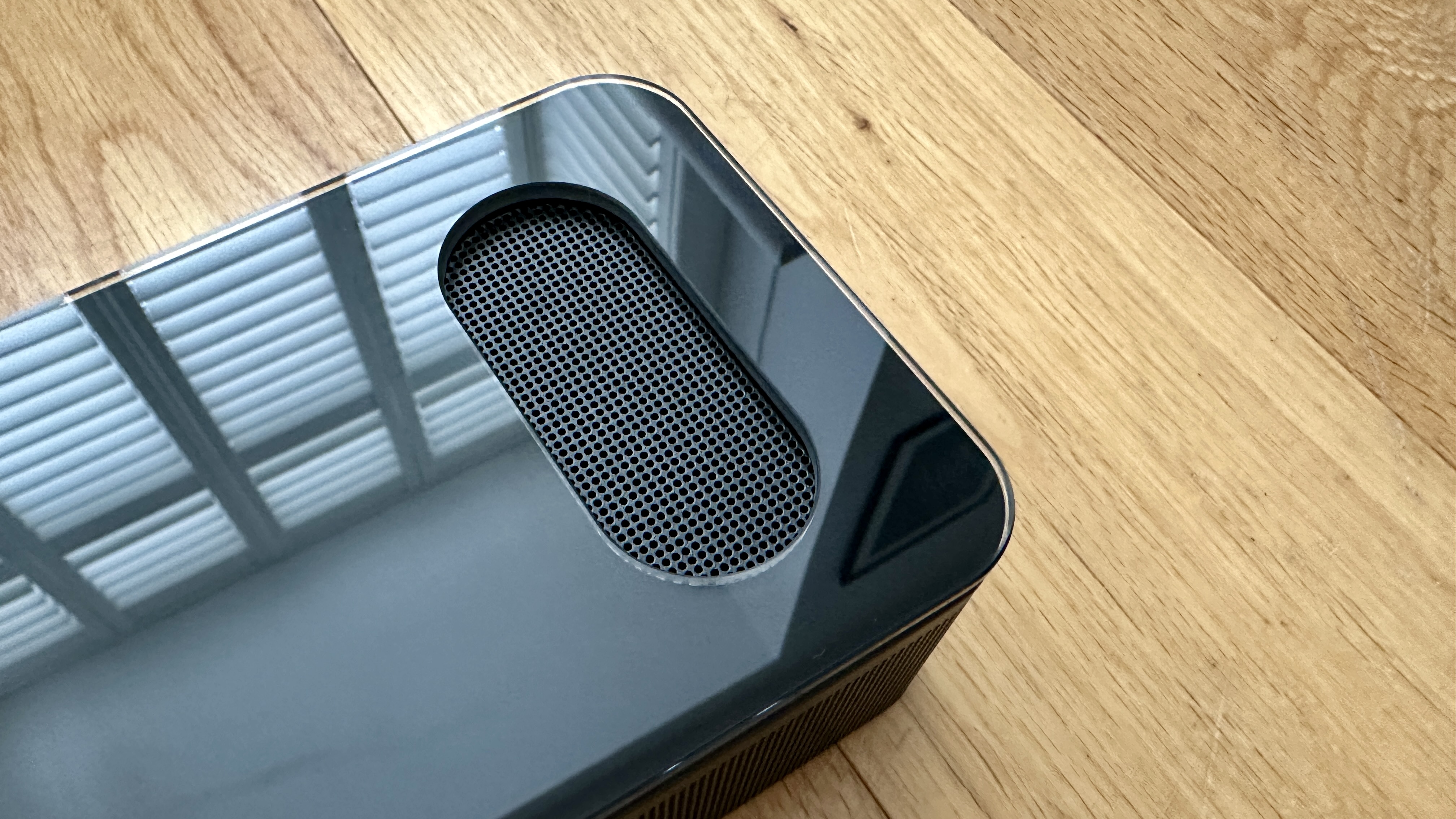
Bose Smart Ultra Soundbar review: price & release date
- Released October 10th 2023
- £899 / $899 / AU$1499
The Bose Smart Ultra Soundbar went on sale on October 10th, 2023. It's priced at $899 in the US, £899 in the United Kingdom, and in Australia it will set you back AU$1,499.
This means it’s a little more affordable than the Sony HT-A7000 or Sennheiser Ambeo Soundbar Plus, both of which we’re big fans of. And more significantly, it’s the same money officially as the very similarly specified (and extremely successful) Sonos Arc, though the Arc is regularly available with discounts now, which means in real terms you should expect to pay less than the price of the Bose.
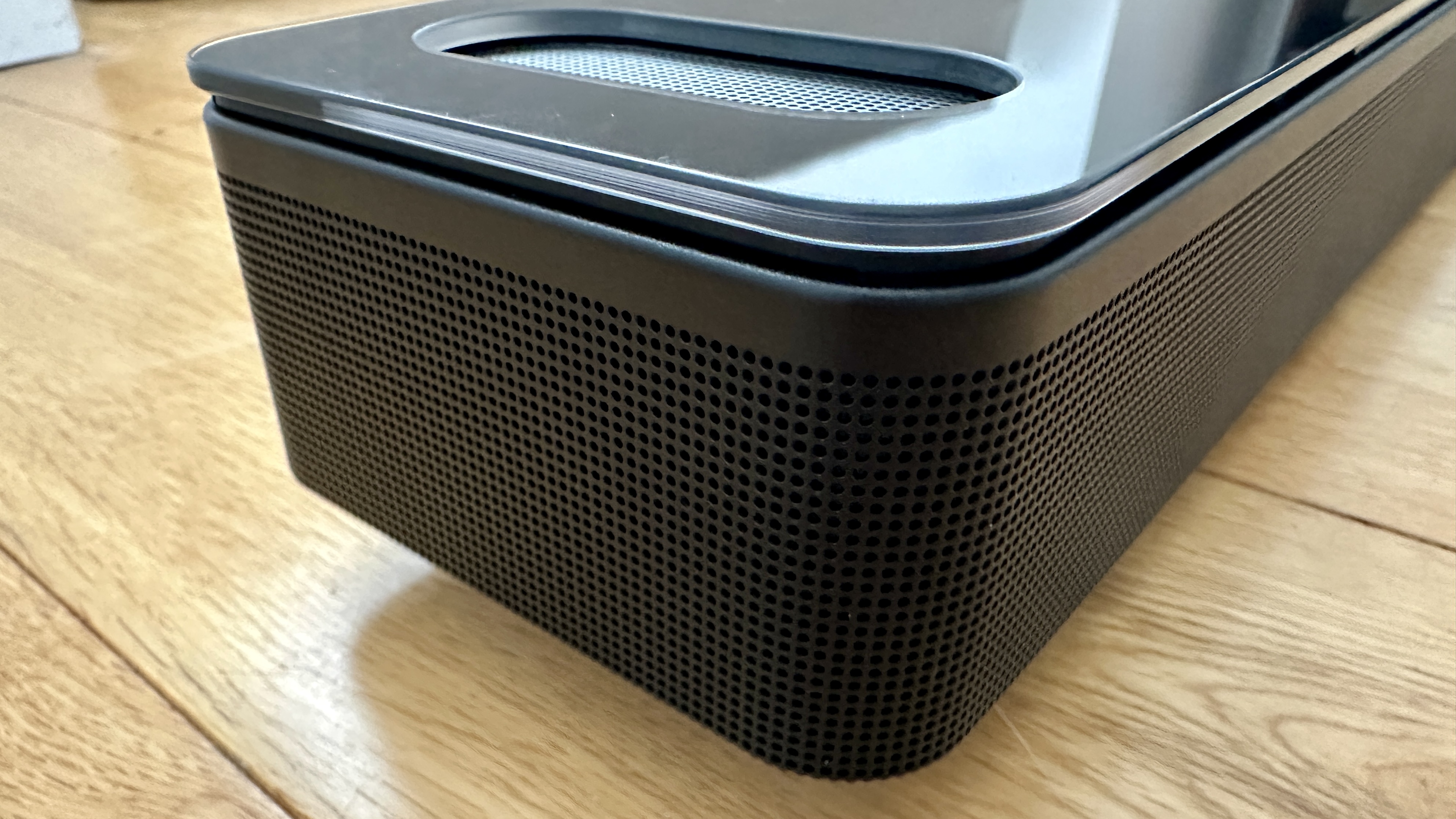
Bose Smart Ultra Soundbar review: Specs
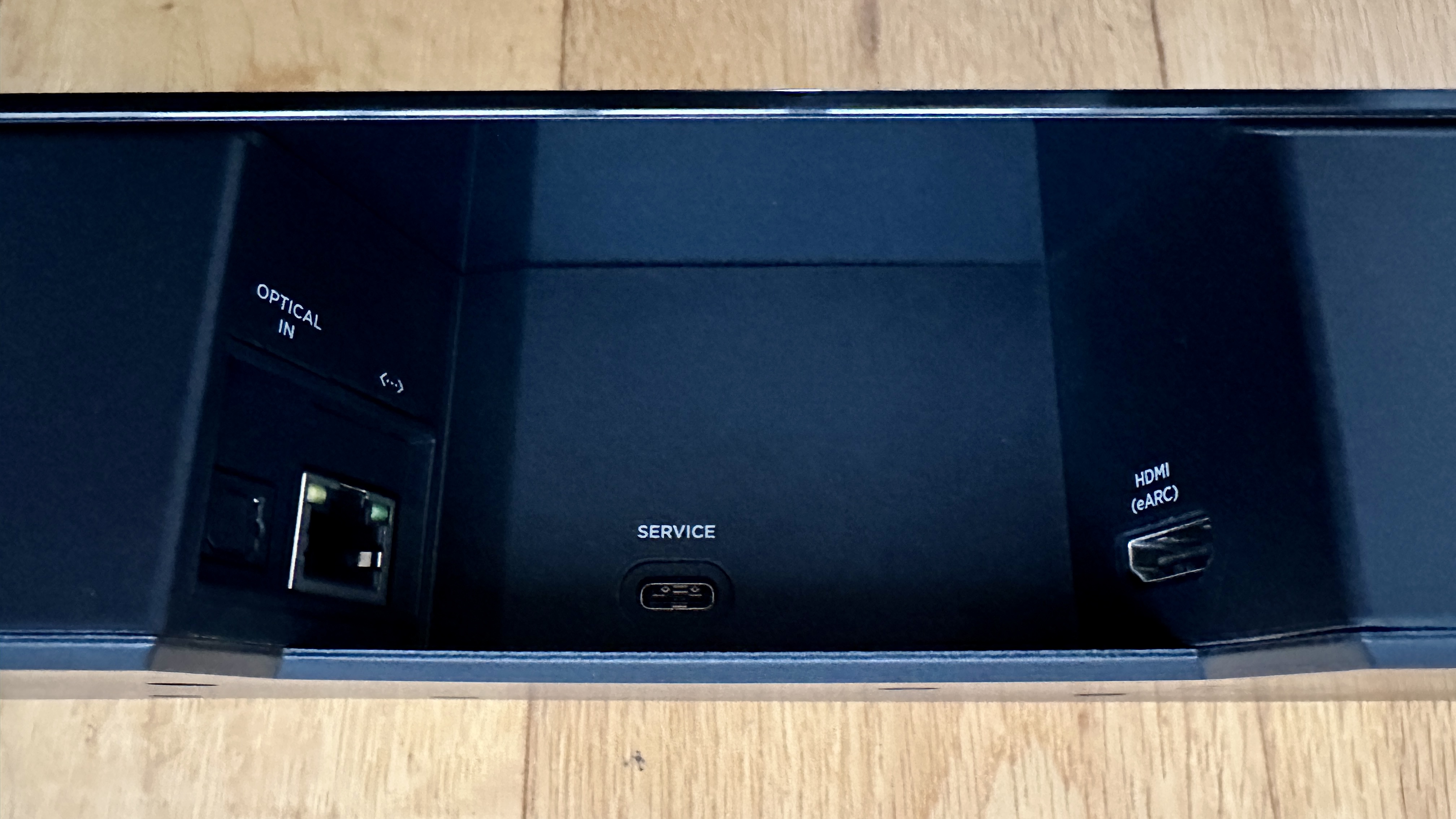
Bose Smart Ultra Soundbar review: Features
- 9 speaker drivers arranged in 5.1.2 channels
- Dolby Atmos support, but no DTS:X
- TrueSpace turns regular audio into Atmos-like sound
The Smart Ultra Soundbar uses a nine-strong line-up of speaker drivers in order to deal with Dolby Atmos spatial audio soundtracks (and Bose's TrueSpace technology to up-mix non-Atmos content to the point that it uses all nine drivers too).
Six of these nine drivers are 100 x 50mm ‘racetrack’ full-range drivers, and are of plastic with ferrite magnets. There’s one behind each exposed metal grille on the top surface of the soundbar, angled in an effort to create the sonic height that’s basically the whole point of a Dolby Atmos soundtrack. The other four are grouped towards the center of the bar – there are two either side of a 25mm neodymium tweeter that’s positioned dead center. There’s another of these tweeters at each end of the soundbar, and they spread sound beyond the physical confines of the soundbar’s cabinet.
It seems safe to assume there are nine discrete blocks of amplification powering this driver array, and it seems safe to assume it’s of the Class D variety. But having seemingly taken a leaf out of the Sonos' playbook of inexplicable secrecy, Bose is neither confirming nor denying. And there’s no indication of the amount of power this putative amplification turns out, either, nor of the Smart Ultra’s frequency response.
Physical connectivity is kept in a couple of little recesses on the rear of the cabinet. In the first you’ll find sockets for HDMI eARC, Ethernet, digital optical and a USB-C slot that’s purely for servicing. In the second there’s power, and a collection of 3.5mm sockets – they’re for data, for connecting the Adaptiq calibration mic, connecting a bass module, and an IR blaster respectively.
Having only one HDMI socket is frustrating here – it's so useful to have at least one passthrough – but the Sonos Arc has the same limitation, so Bose isn't alone.
Wireless connectivity is covered off by Wi-Fi and Bluetooth 5.0. Chromecast is built in, Apple AirPlay 2 is available (both of which make multi-room set-up straightforward), and Spotify can be embedded into the Bose Music control app.
Sound format support extends to Dolby Atmos, Dolby Digital, Dolby TrueHD and Dolby Digital Plus. Bear in mind, though, that TrueSpace is constantly doing its thing, analyzing incoming non-Dolby audio content and deciding how best (or, more particularly, with how much spatial audio effect) it should be delivered. And you’ve further input into the way sound is presented thanks to the defeatable ‘AI Dialogue Mode’ that is constantly assessing audio content to give dialogue (and the midrange in general) a little push towards the front of the soundstage.
- Features score: 4/5
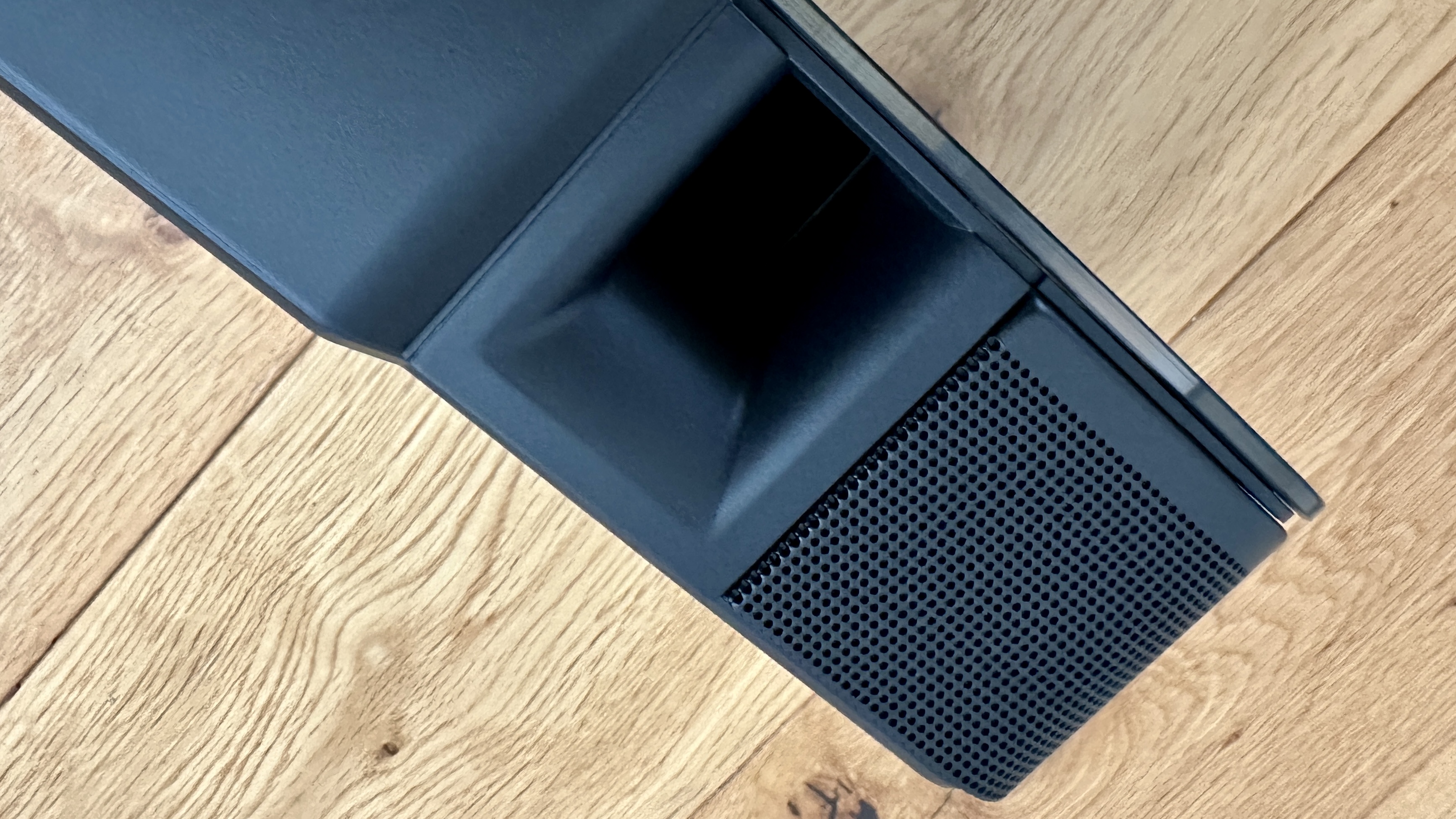
Bose Smart Ultra Soundbar review: Sound quality
- Spacious, organized sound
- Poise and insight in equal measure
- The spatial sound isn't especially pronounced
Like any worthwhile Dolby Atmos soundbar, the Bose Smart Ultra is at its most impressive and convincing when given some properly accomplished Dolby Atmos content to deal with - and when reproducing the painstakingly remastered Atmos soundtrack on a 4K UHD Blu-ray disc of The Shining to deal with, the Bose wastes little time in establishing its credentials.
For example, it’s impressively detailed from the top of the frequency range to the bottom. This is most immediately apparent through the midrange, where voices project well and are absolutely loaded with information regarding tone and timbre as well as character and emotional state. The Bose communicates freely where dialogue is concerned, and voices are distinct and explicit as a result. But it’s true of frequency information on either side, too – bass sounds are respectably deep and varied, while the top of the frequency range is crisp and attacking.
The Smart Ultra isn’t the deepest-digging soundbar you ever heard, it’s true – those who equate ‘punch’ with ‘excitement’ may be a little underwhelmed – and there could be greater substance to treble sounds to balance out their shininess and bite. It’s possible to mitigate these traits just a little in the Bose Music control app, but the fundamentals of the tonality that’s available here will always be apparent.
The driver array does very good work in conjuring appreciable sonic width to the soundtrack – the distance it can reach both left and right is considerably bigger than the physical dimensions of the cabinet. By way of mild contrast, though, the vertical extension the Bose can muster is fairly modest – there’s some height to its presentation, for sure, but it’s not especially pronounced. If your expectations of a Dolby Atmos soundbar include a suggestion of overhead sound, there’s not going to be much about the way the Smart Ultra goes about things to excite you, especially when you can get the multi-channel mastery of the Samsung HW-Q990C for around the same price.
Switching to some two-channel content lets the TrueSpace technology do its thing – and its thing turns out to be pretty effective. The same accurate, detailed and slightly lightweight tonality is in evidence (though just a hint of sibilance creeps into the top of the frequency range) and the same spacious, well-defined soundstage is apparent too. Also apparent is the technology disinclination (or inability) to summon any meaningful suggestion of height to the sound it delivers.
Using Bluetooth to stream a file of Kraftwerk’s Computer World results in quite a lot of the Smart Ultra’s positivity where soundstaging is concerned going astray. Detail levels stay agreeably high, and there’s decent rhythmic expression to the square-edged four/four presentation – but a mild-but-definite vagueness creeps into the layout of the stage, and the latent edginess of the tonality becomes a little more pronounced. TrueSpace has its limits, and it seems that stereo music is among them.
- Sound quality score: 4/5
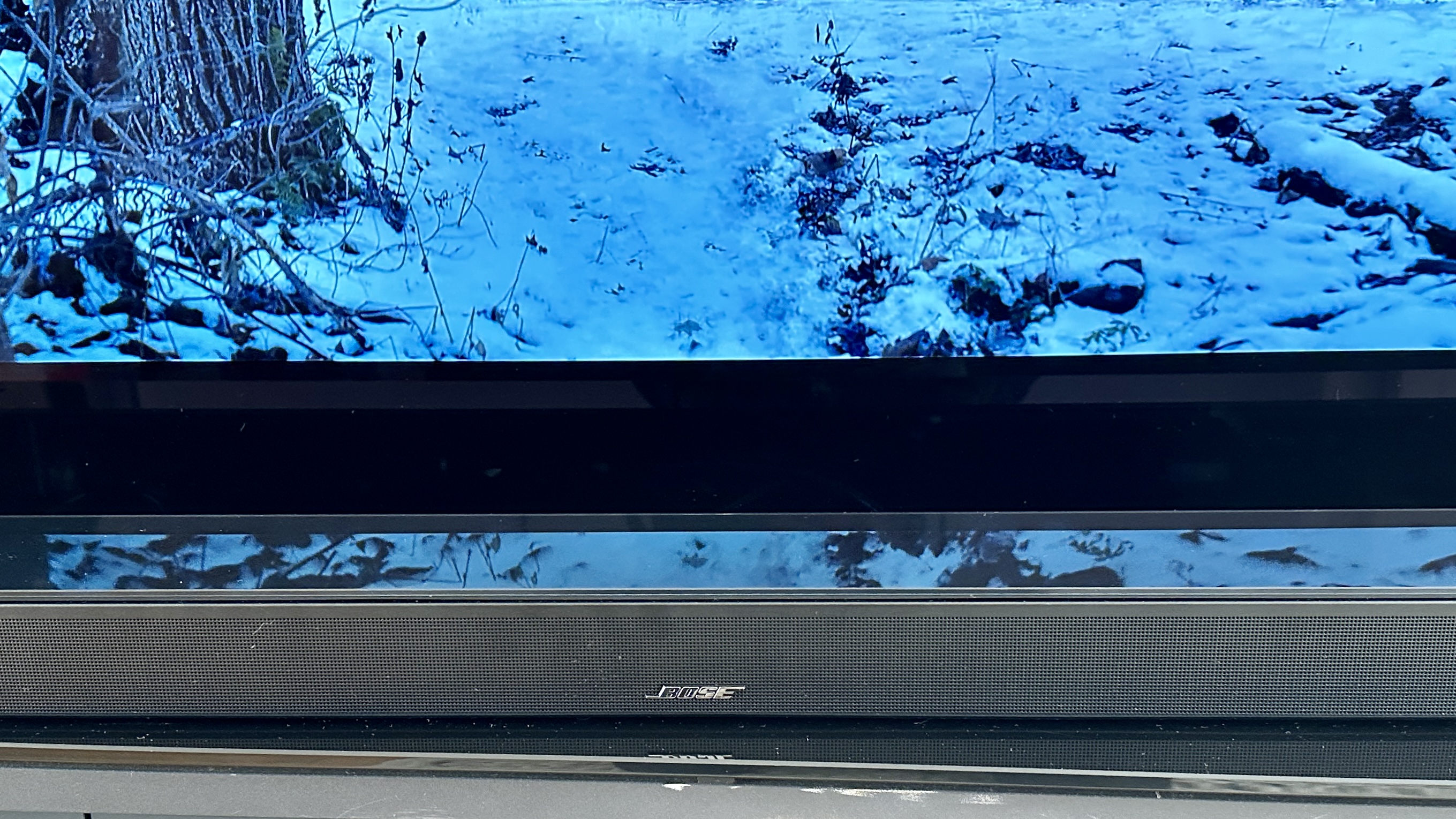
Bose Smart Ultra Soundbar: Design
- Suitable for TVs of 48 inches and up
- Very well-built and premium
- Glass top is highly reflective
Of course, it’s not enough for a soundbar at this sort of money to simply perform to a certain standard – when you’re charging premium money, it’s important to try and add at least a little perceived value where design is concerned too. Bose has decided the way to do that is to top the Smart Ultra Soundbar with tempered glass.
And up to a point, it’s a sound strategy. This soundbar looks a) very similar indeed to the Smart Soundbar 900 it replaces, especially where the cutaways in the glass to expose the metal grille above the up-firing drivers are concerned, and b) a more upmarket and premium proposition than, say, the similarly priced Sonos Arc. But there are a couple of problems with the admittedly luxurious glass finish: it reflects the light of the screen above it quite readily, and it collects fingerprints like a scene-of-crime investigator.
Otherwise, a combination of perforated metal that covers the front face and wraps around the sides of the bar and high-quality plastic make up the Smart Ultra. Build quality is well up to par, and the standard of fit and finish is appropriately impressive.
Its width is about the same as a 48-inch OLED TV, such as the LG C3, so it should work well with this size of TV and up – which is a plus over the Sonos Arc, which needs a TV of at least 55 inches.
- Design score: 4/5
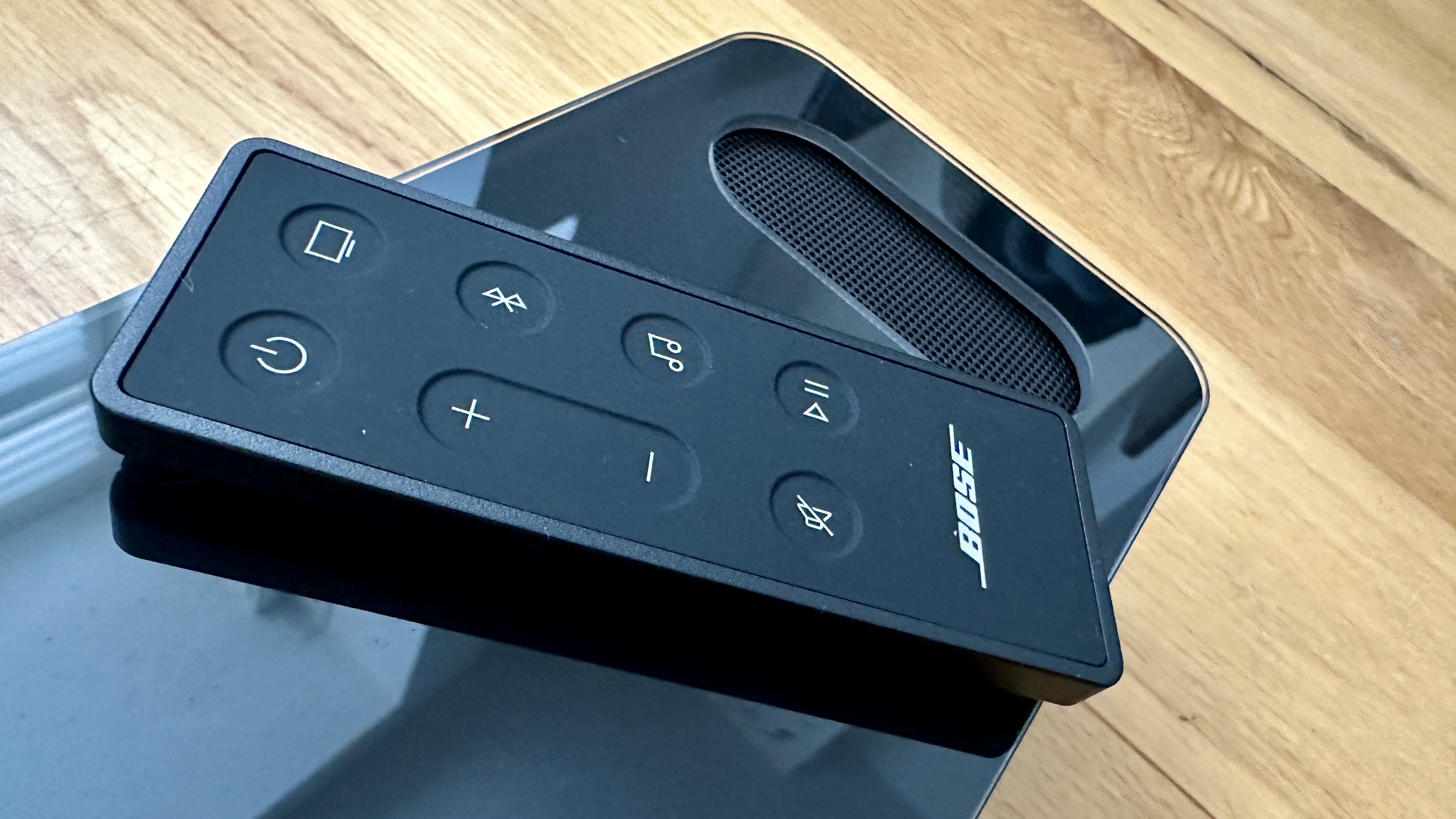
Bose Smart Ultra Soundbar review: Setup & usability
- 'Adaptiq’ automatic room calibration
- Voice, app and remote control
- 'AI Dialogue’ mode is new
You’ve got to hand it to Bose: it’s made setting up the Smart Ultra Soundbar about as simple as can be, and made whoever’s doing it look like a weirdo to any observers at the same time.
Once the soundbar is in position, and the appropriate connection to the TV and to power have been made, opening the ‘Bose Music’ control app that’s free for iOS and Android gives comprehensive control of the Smart Ultra. And first things first: it puts you in charge of the Adaptiq automatic room calibration system. Plug the Adaptiq mic into the rear of the Smart Ultra, and then put the mic on your head. You read that right.
The calibration system fires off the usual selection of test-tones in order to best set up the soundbar to suit your specific environment. The app will ask you to change positions as many as four subsequent times in order to do its thing – and after that you can take your little plastic mic-hat off and hope never to need to use it again.

The app also features volume control, input selection, EQ adjustment for center, height, bass and treble, and an audio delay adjuster to help achieve perfect audio/video sync. It allows you to group your compatible Bose products together (including surround and/or bass speakers if you’re going the full home theater hog), gives access to Spotify and TuneIn internet radio, holds half a dozen assignable presets, and allows you to switch AI Dialogue Mode on or off.
It’s where you can set up Amazon Alexa voice control – which proves sharp-earned and reliable. The Bose Voice4Video feature leverages the power of Alexa to allow you to take control of your TV, cable- or satellite TV box using your voice, meaning you can switch on the TV and switch inputs just by asking. The Smart Ultra can also be used with Google Assistant, provided there’s an appropriate speaker on a common network.
This is a responsive, useful app, and is admirably unfussy in the way it presents itself, too.
There’s a little remote control handset too, if you prefer. It covers only the headline controls – input selection volume up/down/mute, play/pause and power on/off – but its rubbery long-travel buttons feel quite good, and it’s useful if the device you’ve installed the app on isn't to hand.
There are a grand total of two physical controls on the soundbar itself, both capacitive touch-surfaces. One switches the integrated mics on or off, while the other is a multifunction ‘action’ control.
- Setup & usability: 5/5
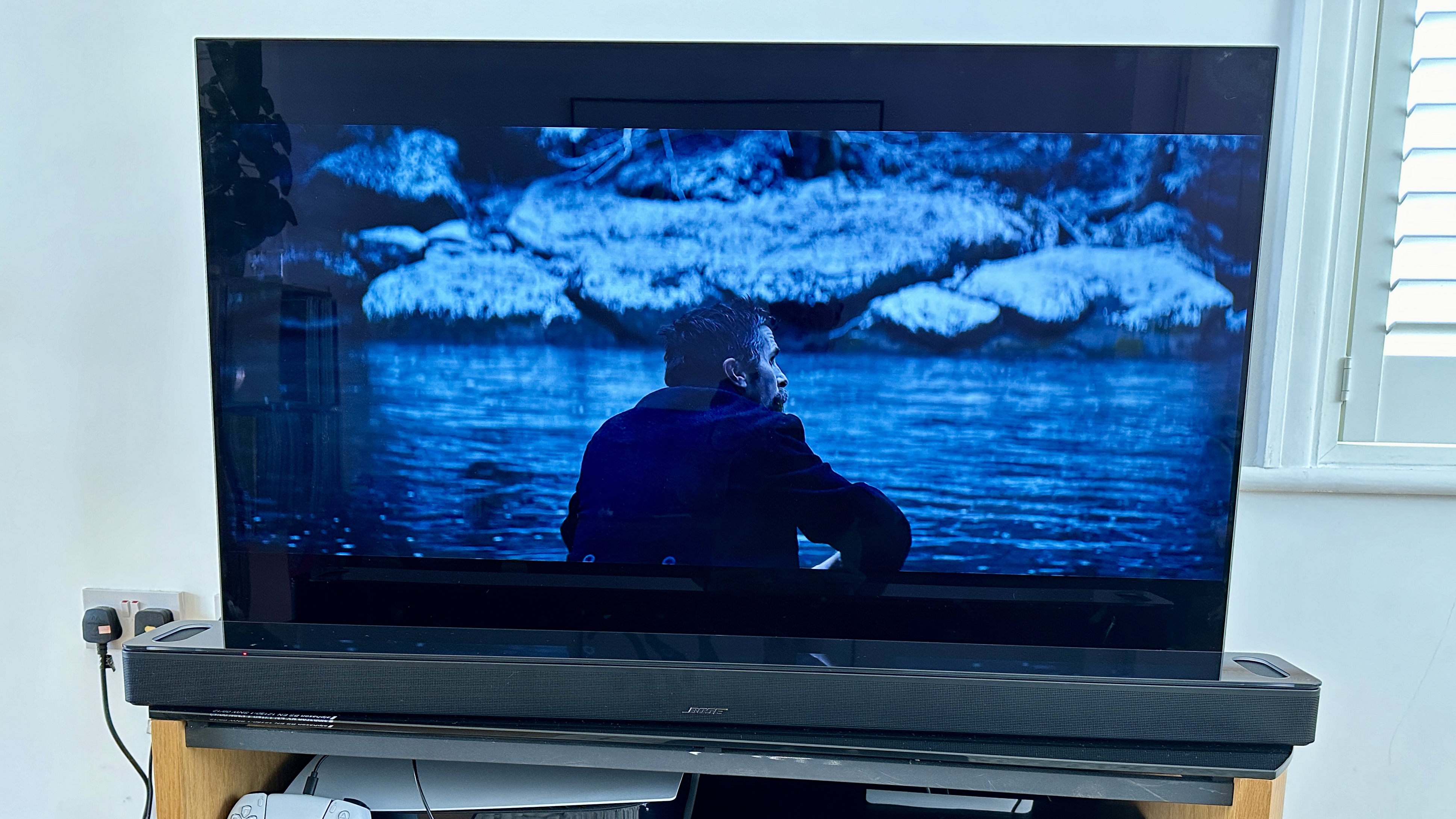
Bose Smart Ultra Soundbar review: Value
- Big, organized sound
- Great build quality and excellent control options
- Seems a touch expensive next to its most obvious rivals
If we accept that Bose has the Sonos Arc squarely in its sights with the Smart Ultra Soundbar, then I have to conclude that the Bose is just a little overpriced. Yes, it’s flawlessly constructed and finished, from materials that look and feel good (the suitability of glass in front of a TV notwithstanding), and it’s simple to set up in the first place and operate thereafter.
But while there’s plenty of merit in the way it performs, not least in its wide, well-defined and nicely balanced presentation, it’s slightly lacking in a couple of areas. And given that these areas – low-frequency impact and the creation of appreciable sonic height – are among the Sonos Arc’s particular strengths as an all-in-one soundbar, they seem almost compounded. Which in turns serves to make the Bose Smart Ultra Soundbar seem a less compelling proposition than it otherwise would.
- Value score: 3.5/5
Should I buy the Bose Smart Ultra Soundbar?
Buy it if...
Don't buy it if...
Bose Smart Ultra Soundbar review: Also consider
How I tested the Bose Smart Ultra Soundbar
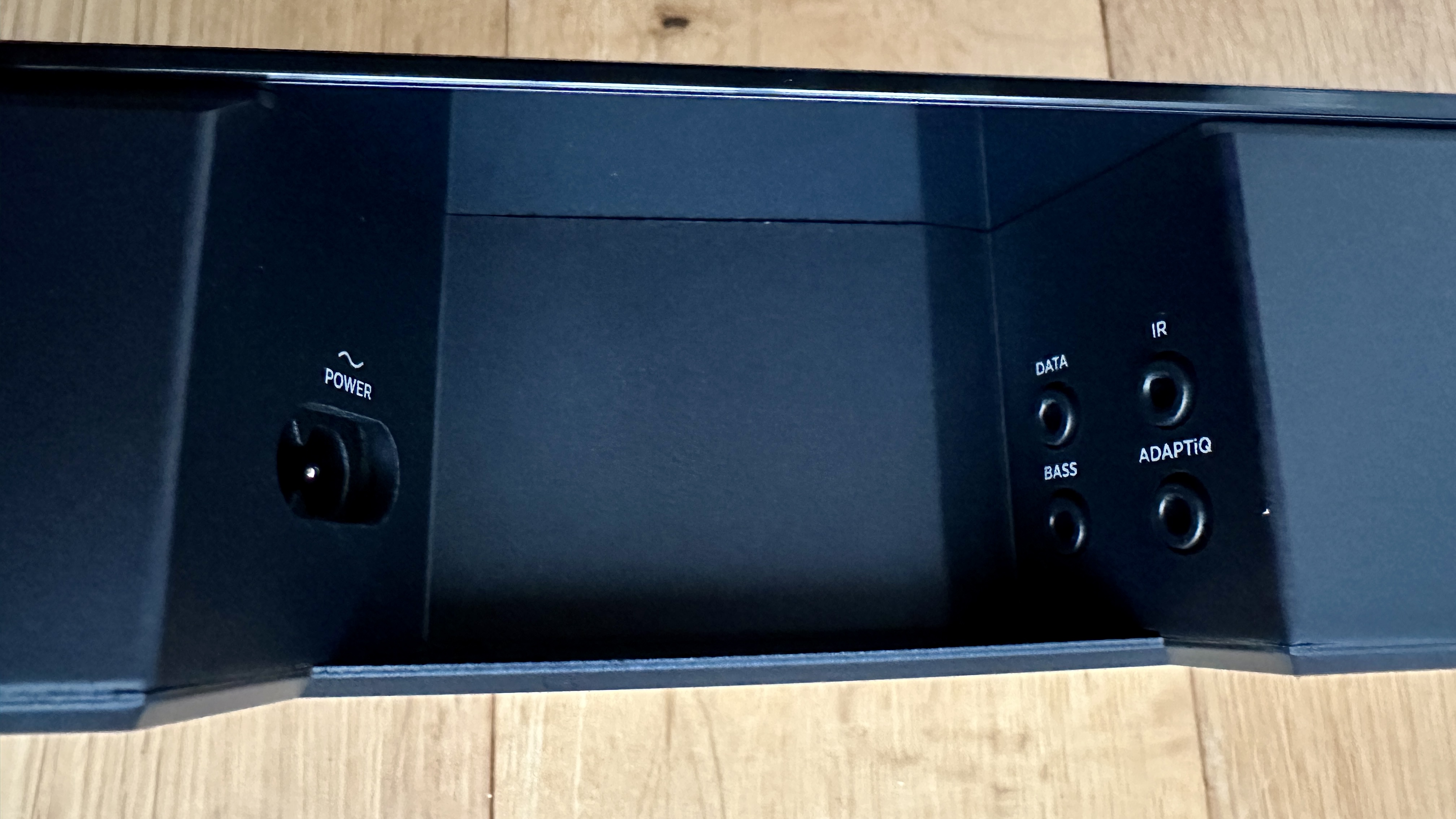
- Tested a standard living space
- Used for over a week
- Tested with streaming services and 4K UHD Blu-ray content
The Bose Smart Ultra Soundbar has been sitting beneath a Philips OLED TV (where it happily reflects part of the images coming from above) for well over a week. For several days it’s been working full 10-hours shifts while I assess its performance – plus, of course, it’s been doing its thing for an hour or two every evening while the household unwinds in front of the television. The room it’s in is open-plan, so side boundaries are fairly distant, but the ceilings are of unremarkable height, which is helpful to soundbars when it comes to generating overhead audio effects.
Content has been sourced from premium-tier video streaming services, from Dolby Atmos-enabled 4K UHD Blu-ray discs, from broadcast TV and, for music, via Bluetooth and the Spotify account embedded into the Bose Music app.
- First reviewed: October 2023
- Read more about how we test







